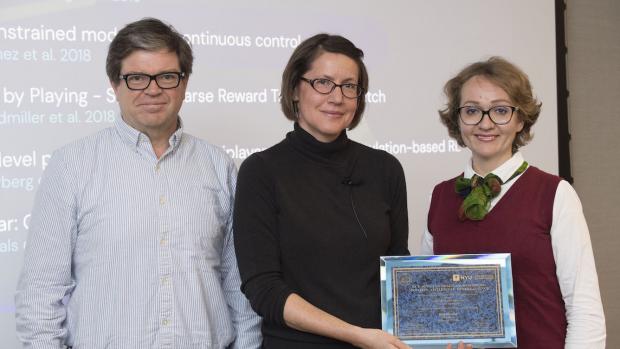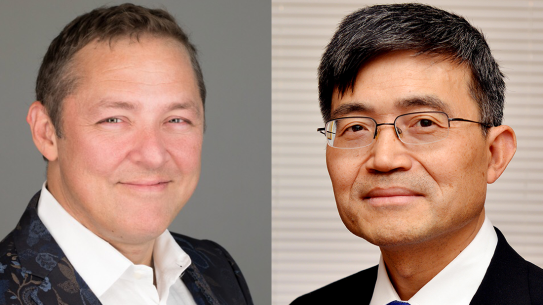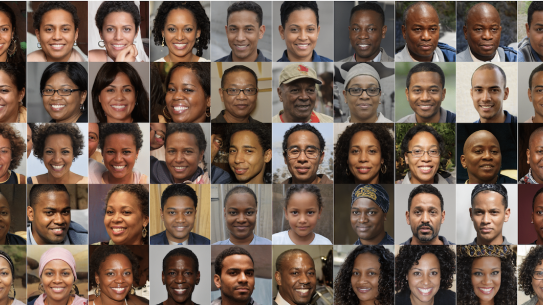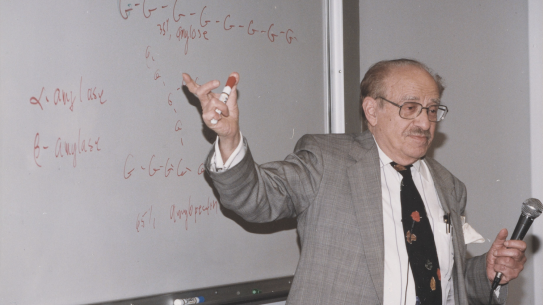Final lecture in AI Seminar Series explores how machines might learn as humans do

Yann LeCun (Turing Prize winner and past speaker of the seminar) with Raia Hadsell (seminar speaker and former Ph.D. student of LeCun) and Anna Choromanska (seminar organizer and former Post-doctoral student of LeCun).
The third annual Modern Artificial Intelligence (AI) seminar series at NYU Tandon, bringing together students and experts to discuss recent advances in the field, wrapped up on December 6 with a presentation by Raia Hadsell, Head of Robotics Research at DeepMind. In the final presentation of the series, sponsored by the Department of Electrical and Computer Engineering and organized by Professor Anna Choromanska, Hadsell explored ways in which human learning can inform machine learning systems to develop highly sophisticated AI to solve complex real-world tasks.
The Fall roster kicked off in early October with a lecture by Facebook AI Research’s Leon Bottou. The researcher, who harbors the long-term ambition of replicating human-level intelligence, examined causal inference, or finding the relationship between existing facts and objects. Next, on November 14, Francis Bach, researcher at Institut National de Recherche en Informatique et en Automatique (INRIA) in France, spoke about a new generation of “distributed optimization” schemes that are critically needed to scale algorithms to massive data.
In her seminar, Hadsell showed how humans, in contradistinction to current AI systems, learn best by exploring subjects deeply, one at a time, so that understanding and context precede the random sampling of facts (she used school curricula as an example, suggesting that it would not be such a good pedagogical practice to tear random pages from texts and present them to students.)
“Human learning does best by a prolonged inspection and investigation of a single subject,” she said. “If in machine learning we could start to learn more in this way at as well, by being able to learn multiple subjects but each one deeply, yet being able to learn other subjects as well we might have a very powerful model that goes far beyond the process of sampling data and bringing them together as data sets.”
Next semester, the series spotlights the work of Jan Kautz, Vice President of Learning and Perception at NVIDIA, followed by Gabor Lugosi, Research Professor at the Department of Economics at the Pampeu Fabra University; Nicolo Cesa-Bianchi, Professor of Computer Science at the University of Milan; and Robert Schapire, a professor at Princeton University and partner researcher at Microsoft Research.
“The ECE Tandon Seminar Series on Modern AI has become a flagship event for NYU Tandon,” said Choromanksa, professor of electrical and computer engineering at NYU Tandon, and host of the series. “It also attracts students and researchers outside of NYU Tandon, such as those from NYU Courant and NYU Center for Data Science. Our goal is to popularize high-quality AI research, and this series has already been viewed online by over 14,000 people, so we are also thrilled that it is watched worldwide; the success of the series exceeded my expectations and motivates me to continue.”
Since launching in 2017 the series has featured a veritable hall of fame in artificial intelligence (AI), featuring preeminent researchers from the likes of Google, Facebook, Microsoft, Deepmind, Netflix, JP Morgan Chase; and preeminent scientists from Columbia University, Carnegie Mellon, Cal Tech and more. It has featured Nobel laureate Eric Kandel, Turing Prize winner and chief AI scientist at Facebook Yann LeCunn, as well as famed venture capitalist Kai-Fu Lee, director of Microsoft Research Asia.
The live-streamed lecture series, held at 370 Jay Street, Brooklyn, New York, and at NYU Tandon’s MakerSpace at 6 MetroTech, has garnered a worldwide audience numbering in the thousands who have viewed the 13 seminars archived on the YouTube playlist.





